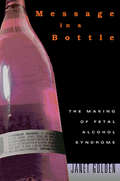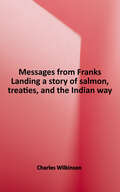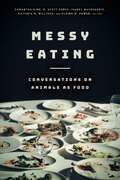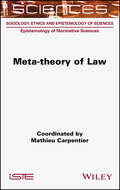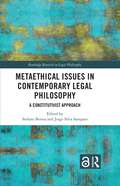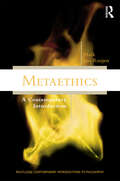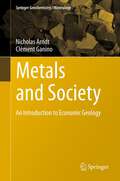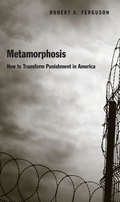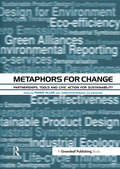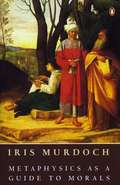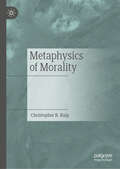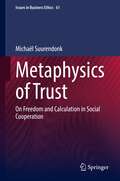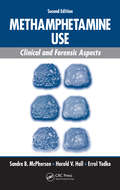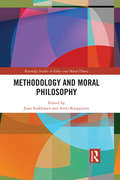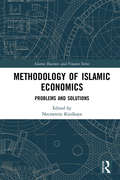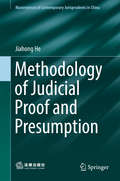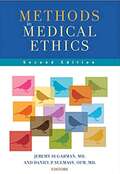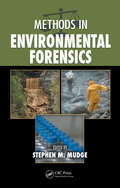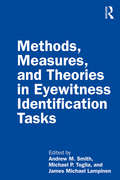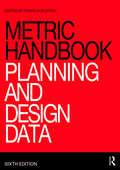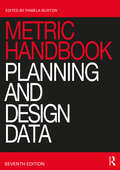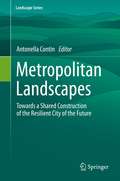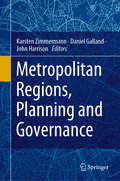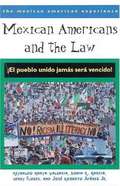- Table View
- List View
Message in a Bottle: The Making of Fetal Alcohol Syndrome
by Janet GoldenA generation has passed since a physician first noticed that women who drank heavily while pregnant gave birth to underweight infants with disturbing tell-tale characteristics. Women whose own mothers enjoyed martinis while pregnant now lost sleep over a bowl of rum raisin ice cream. In Message in a Bottle, Janet Golden charts the course of Fetal Alcohol Syndrome (FAS) through the courts, media, medical establishment, and public imagination. Long considered harmless during pregnancy (doctors even administered it intravenously during labor), alcohol, when consumed by pregnant women, increasingly appeared to be a potent teratogen and a pressing public health concern. Some clinicians recommended that women simply moderate alcohol consumption; others, however, claimed that there was no demonstrably safe level for a developing fetus, and called for complete abstinence. Even as the diagnosis gained acceptance and labels appeared on alcoholic beverages warning pregnant women of the danger, FAS began to be de-medicalized in some settings. More and more, FAS emerged in court cases as a viable defense for people charged with serious, even capital, crimes and their claims were rejected. Golden argues that the reaction to FAS was shaped by the struggle over women's relatively new abortion rights and the escalating media frenzy over "crack" babies. It was increasingly used as evidence of the moral decay found within marginalized communities--from inner-city neighborhoods to Indian reservations. With each reframing, FAS became a currency traded by politicians and political commentators, lawyers, public health professionals, and advocates for underrepresented minorities, each pursuing separate aims.
Messages from Frank's Landing: A Story of Salmon, Treaties, and the Indian Way
by Charles WilkinsonIn 1974 Federal Judge George H. Boldt issued one of the most sweeping rulings in the history of the Pacific Northwest, affirming the treaty rights of Northwest tribal fishermen and allocating to them 50 percent of the harvestable catch of salmon and steelhead. Among the Indians testifying in Judge Boldt’s courtroom were Nisqually tribal leader Billy Frank, Jr., and his 95-year-old father, whose six acres along the Nisqually River, known as Frank’s Landing, had been targeted for years by state game wardens in the so-called Fish Wars. <p><p>By the 1960s the Landing had become a focal point for the assertion of tribal treaty rights in the Northwest. It also lay at the moral center of the tribal sovereignty movement nationally. The confrontations at the Landing hit the news and caught the conscience of many. Like the schoolhouse steps at Little Rock or the bridge at Selma, Frank’s Landing came to signify a threshold for change, and Billy Frank, Jr., became a leading architect of consensus, a role he continues today as one of the most colorful and accomplished figures in the modern history of the Pacific Northwest. <p><p>In Messages from Frank’s Landing, Charles Wilkinson explores the broad historical, legal, and social context of Indian fishing rights in the Pacific Northwest, providing a dramatic account of the people and issues involved. He draws on his own decades of experience as a lawyer working with Indian people, and focuses throughout on Billy Frank and the river flowing past Frank’s Landing. In all aspects of Frank’s life as an activist, from legal settlements negotiated over salmon habitats destroyed by hydroelectric plants, to successful negotiations with the U.S. Army for environmental protection of tribal lands, Wilkinson points up the significance of the traditional Indian world view - the powerful and direct legacy of Frank’s father, conveyed through generations of Indian people who have crafted a practical working philosophy and a way of life. <p><p>Drawing on many hours spent talking and laughing with Billy Frank while canoeing the Nisqually watershed, Wilkinson conveys words of respect and responsibility for the earth we inhabit and for the diverse communities the world encompasses. These are the messages from Frank’s Landing. Wilkinson brings welcome clarity to complex legal issues, deepening our insight into a turbulent period in the political and environmental history of the Northwest.
Messy Eating: Conversations on Animals as Food
by Samantha King R. Scott Carey Isabel Macquarrie Elaine M. Power Victoria N. MilliousLiterature on the ethics and politics of food and that on human–animal relationships have infrequently converged. Representing an initial step toward bridging this divide, Messy Eating features interviews with thirteen prominent and emerging scholars about the connections between their academic work and their approach to consuming animals as food. The collection explores how authors working across a range of perspectives—postcolonial, Indigenous, black, queer, trans, feminist, disability, poststructuralist, posthumanist, and multispecies—weave their theoretical and political orientations with daily, intimate, and visceral practices of food consumption, preparation, and ingestion. Each chapter introduces a scholar for whom the tangled, contradictory character of human–animal relations raises difficult questions about what they eat. Representing a departure from canonical animal rights literature, most authors featured in the collection do not make their food politics or identities explicit in their published work. While some interviewees practice vegetarianism or veganism, and almost all decry the role of industrialized animal agriculture in the environmental crisis, the contributors tend to reject a priori ethical codes and politics grounded in purity, surety, or simplicity. Remarkably free of proscriptions, but attentive to the Eurocentric tendencies of posthumanist animal studies, Messy Eating reveals how dietary habits are unpredictable and dynamic, shaped but not determined by life histories, educational trajectories, disciplinary homes, activist experiences, and intimate relationships. These accessible and engaging conversations offer rare and often surprising insights into pressing social issues through a focus on the mundane—and messy— interactions that constitute the professional, the political, and the personal. Contributors: Neel Ahuja, Billy-Ray Belcourt, Matthew Calarco, Lauren Corman, Naisargi Dave, Maneesha Deckha, María Elena García, Sharon Holland, Kelly Struthers Montford, H. Peter Steeves, Kim TallBear, Sunaura Taylor, Harlan Weaver, Kari Weil, Cary Wolfe
Mestizo International Law
by Arnulf Becker LorcaThe development of international law is conventionally understood as a history in which the main characters (states and international lawyers) and events (wars and peace conferences) are European. Arnulf Becker Lorca demonstrates how non-Western states and lawyers appropriated nineteenth-century classical thinking in order to defend new and better rules governing non-Western states' international relations. By internalizing the standard of civilization, for example, they argued for the abrogation of unequal treaties. These appropriations contributed to the globalization of international law. With the rise of modern legal thinking and a stronger international community governed by law, peripheral lawyers seized the opportunity and used the new discourse and institutions such as the League of Nations to dissolve the standard of civilization and codify non-intervention and self-determination. These stories suggest that the history of our contemporary international legal order is not purely European; instead they suggest a history of a mestizo international law.
Meta-theory of Law
by Mathieu CarpentierThis book is devoted to the theory of legal theory, also referred to as the "meta-theory of law".The aim of this emerging discipline is to determine the objectives, aims and methods of legal theory, and to establish the conditions of possibility as well as the validity criteria for theoretical discourse on law. The contributions in this book provide an overview of these aspects through different perspectives and approaches.The very purpose of legal theory has been disputed and the subject area is currently subject to increasing cross-fertilization between different, and sometimes diverging, traditions. Meta-theory of Law assesses these emerging trends by questioning two basic objects of legal theory, the "nature" and the "science" of law.
Metaethical Issues in Contemporary Legal Philosophy: A Constitutivist Approach (Routledge Research in Legal Philosophy)
by Jorge Silva Sampaio Stefano BerteaThis volume explores the importance of constitutivism for legal studies. Constitutivism is the view that the normative force, or authority, of practical reasons is grounded in principles, capacities, aims, or functions that are essential to, and thus constitutive of, agency. While the implications that the constitutivist approach has on the fundamental metaethical disputes and central ethical debates have been extensively explored, the literature on the relations between constitutivism and law remains scarce, unsystematic, and sporadic. This collection brings together world-renowned practical philosophers and legal theorists to fill a noticeable gap in the literature. The authors systematically and innovatively address key dimensions of the relationships between constitutivism and the theoretical study of law, as well as programmatically offering novel insights into the conceptual connections between constitutivist claims, fundamental legal concepts and practices, legal issues, and, ultimately, the law as a distinctive concept. The book will be of interest to academics and researchers working in the areas of Legal Philosophy, Legal Theory, Jurisprudence, Moral Philosophy and Metaethics.Chapter 8 of this book is freely available as a downloadable Open Access PDF at http://www.taylor-francis.com under a Creative Commons Attribution-Non Commercial-No Derivatives (CC-BY-NC-ND) 4.0 license.
Metaethics: A Contemporary Introduction (Routledge Contemporary Introductions to Philosophy)
by Mark van RoojenMetaethics: A Contemporary Introduction provides a solid foundation in metaethics for advanced undergraduates by introducing a series of puzzles that most metaethical theories address. These puzzles involve moral disagreement, reference, moral epistemology, metaphysics, and moral psychology. From there, author Mark van Roojen discusses the many positions in metaethics that people will take in reaction to these puzzles. Van Roojen asks several essential questions of his readers, namely: What is metaethics? Why study it? How does one discuss metaethics, given its inherently controversial nature? Each chapter closes with questions, both for reading comprehension and further discussion, and annotated suggestions for further reading.
Metals and Society
by Nicholas Arndt Clément GaninoIn the second edition Steve Kesler (University of Michigan) has been added as an author to rewrite some chapters. The motivation for this revised edition is to more intensively address economic issues that surround the exploitation of mineral resources. This emphasis gives the book a unique character. With these sections Metals and Society deals with issues that pervade much of current science reporting - the rate of exploitation of natural resources, the question of when or if these resources will be exhausted, the pollution and social disturbance that accompanies mining, the compromises and challenges that arise from the explosion of demand from China, India and other rapidly developing countries, and the moral issues that surround mining of metals in lesser developed countries for consumption in the "first-world" countries. With its dual character, the book will be useful as an introductory text for students in the earth sciences and a reference volume for students, teachers and researchers of geography, economics and the social sciences.
Metamorphosis: How to Transform Punishment in America
by Robert A FergusonIn the past few years, the need for prison reform in America has reached the level of a consensus. We agree that many prison terms are too long, especially for nonviolent drug offenders; that long-term isolation is a bad idea; and that basic psychiatric and medical care in prisons is woefully inadequate. Some people believe that contracting out prison services to for-profit companies is a recipe for mistreatment. Robert Ferguson argues that these reforms barely scratch the surface of what is wrong with American prisons: an atmosphere of malice and humiliation that subjects prisoners and guards alike to constant degradation. Bolstered by insights from hundreds of letters written by prisoners, Ferguson makes the case for an entirely new concept of prisons and their purpose: an “inner architectonics of reform” that will provide better education for all involved in prisons, more imaginative and careful use of technology, more sophisticated surveillance systems, and better accountability.
Metaphors for Change: Partnerships, Tools and Civic Action for Sustainability
by David Gee Penny Allen Christophe BonazziHow can we get from where we are to where we want to be? Metaphors for Change attempts to answer this question and provide a roadmap for sustainability by bringing together the thoughts of a unique collection of leading change agents from business, government and academia. Environmental questions have previously been dealt with metaphorically, by catastrophism or manicheism (zero growth; Malthusianism, Deep Ecology; "man is the enemy"; less is more). These metaphors have had limited impact because they have failed to connect with the mainstream of cultural, political, and business ideas. This book examines a number of new metaphors – and related partnerships, tools and action – which appear to have greater possibilities for the world in which we now live. The editors argue that Metaphors for Change can deliver to the public and to decision-makers new perceptions ("structured knowledge") that can help interpret the past and the present, and help us forge the future. The wider the gap between the "now" and the "necessary", the stronger the bridging perceptions have to be in order to break through barriers of fear and conservatism. Some of the concepts considered are: sustainable development; the polluter pays principle; the precautionary principle; eco-efficiency; eco-effectiveness; life-cycle assessment; design for the environment; eco-services; dematerialization; industrial symbiosis; industrial ecology; and zero emissions. There are of course other useful metaphors on the horizon, some of them included in this book. Including key contributions from the ground-breaking conferences ECO 97 and ECO 99, along with other specially commissioned and reprinted pieces, Metaphors for Change provides a treasure chest of new ideas, innovations and action. Accessible and forward-thinking, it will prove indispensable both as a student learning tool and as a panoramic overview of the sustainability metaphors key thinkers believe we should be putting into practice.
Metaphysics as a Guide to Morals
by Iris MurdochThe decline of religion and ever increasing influence of science pose acute ethical issues for us all. Can we reject the literal truth of the Gospels yet still retain a Christian morality? Can we defend any 'moral values' against the constant encroachments of technology? Indeed, are we in danger of losing most of the qualities which make us truly human? Here, drawing on a novelist's insight into art, literature and abnormal psychology, Iris Murdoch conducts an ongoing debate with major writers, thinkers and theologians--from Augustine to Wittgenstein, Shakespeare to Sartre, Plato to Derrida--to provide fresh and compelling answers to these crucial questions.
Metaphysics of Morality
by Christopher B. KulpThis is a book on metaethics—in particular, an inquiry into the metaphysical foundations of morality. After carefully exploring the metaphysical commitments, or lack thereof, of the leading versions of moral anti-realism, Kulp develops a new and in-depth theory of moral realism. Starting with the firm recognition of the importance of our common sense belief that we possess a great deal of moral knowledge—that, for example, some acts are objectively right and some objectively wrong—the book goes on to examine the metaphysical grounds of various skeptical responses to this perspective. In great part, the book is devoted to developing a version of realist metaethics: specifically, developing in detail realist theories of moral truth, moral facts, and moral properties.Concluding with the rejection of prominent contemporary forms of moral anti-realism, Kulp presents a rigorous non-naturalistic theory of moral realism, and a vindication of the basic commitments of commonsense moral thought.
Metaphysics of Trust: On Freedom and Calculation in Social Cooperation (Issues in Business Ethics #61)
by Michaël SuurendonkThis book provides the foundations of trust amidst radical uncertainty. Specifically, it addresses the question of under what condition it is possible to trust relative strangers. As the first logical investigation of its kind, the book breaks with many preconceived ideas we have about trust and the scientific method that leads to its clarification. It builds on the insight that, contrary to widespread belief, it is not risk but freedom that is most fundamental for explaining trust. In fact, trust is the giving of freedom, out of freedom, and one’s consciousness of the potential risks involved merely disturbs one’s ability to trust. The book makes the twofold normative claim that any legitimate scientific preoccupation with trust must necessarily include the concept of freedom in its account, and that theories of trust that run against the logical prerequisites of freedom are a-priori falsified. It presents a theoretical proposal that makes sure that trust, instead of being constructed as a passive and functional “illusion” of natural love, is understood as the necessary product of an active reason that is oriented towards developing human autonomy.
Methamphetamine Use: Clinical and Forensic Aspects, Second Edition
by Sandra B. McPherson Harold V. Hall Errol YudkoUpdated and expanded to reflect changes in recent years, this second edition covers virtually every aspect of this dangerous drug, including history, pharmacology, pathology, physiology, treatment, clinical and forensic psychology, and legal aspects. This edition features new chapters on criminal- and civil-forensic applications including an in-depth discussion of recent laws. Pointing out important cases, articles, and statistics, the text also presents chapters on neuropsychological testing; normative data on risk analysis and violence prediction; the physiology of tweaking, the most dangerous stage of the meth cycle; and the efficacy of treatment programs including examples from newly established drug courts.
Methodology and Moral Philosophy (Routledge Studies in Ethics and Moral Theory)
by Jussi Suikkanen Antti KauppinenMany ethicists either accept the reflective equilibrium method or think that anything goes in ethical theorizing as long as the results are plausible. The aim of this book is to advance methodological thinking in ethics beyond these common attitudes and to raise new methodological questions about how moral philosophy should be done. What are we entitled to assume as the starting-point of our ethical inquiry? What is the role of empirical sciences in ethics? Is there just one general method for doing moral philosophy or should different questions in moral philosophy be answered in different ways? Are there argumentative structures and strategies that we should be encouraged to use or typical argumentative patterns that we should avoid? This volume brings together leading moral philosophers to consider these questions. The chapters investigate the prospects of empirical ethics, outline new methods of ethics, evaluate recent methodological advances, and explore whether different areas of moral philosophy are methodologically continuous or independent of one another. The aim of Methodology and Moral Philosophy is to make moral philosophers more self-aware and reflective of the way in which they do moral philosophy and also to encourage them to take part in methodological debates.
Methodology of Islamic Economics: Problems and Solutions (Islamic Business and Finance Series)
by Necmettin KizilkayaIn its pursuit to equip the reader with a basic knowledge of Islamic economics, this book divulges the micro-foundations of the discipline, and highlights the predominant schools of thought that exist in the field. It explains, in simple terms, what Islamic economics entails and how it can be studied as a science in relation to the Holy Quran, the Sunnah and the Islamic intellectual tradition based on these two sources. The book familiarizes the reader with knowledge of the basic maxims of the discipline. It then establishes the arguments that are presented by the proponents of religion-based economics, specifically Islam, and apprises readers about the aforementioned schools as they exist. A number of chapters consider the dimension of the dilemmas the discipline is facing, and the chronological progress of the field is reviewed, hence providing a comprehensive overview of the topic. The book deals with the issues about the origins of Islamic economics, the basic methodological questions, the use of the opportunities offered by fiqh in the methodological discussions and the main problems arising from the encounter with other cultures and civilizations. It offers practical solutions, despite the differing schools of thought, not unlike the development of conventional Economics where radical differences between Keynesian, Classical and Monetarist approaches existed. It concludes by incorporating some of the finest works that explain to the reader how Islamic economics may progress as a discipline. This guide will provide both students and researchers in Comparative Economic Studies, Islamic Economics and Islamic Finance with an essential overview of the field.
Methodology of Judicial Proof and Presumption (Masterpieces of Contemporary Jurisprudents in China)
by Jiahong HeThis book offers the first theoretical approach to rules of evidence and the practice of judicial proof in China written in English by a Chinese professor. As Prof. He's first representative work, based on over three decades of studying and researching evidence law, it clarifies concepts relevant to evidence law, highlights the value of studying evidence law, re-examines the domain of presumption, reviews central problems in obtaining evidence, and discusses the reasons for misjudged cases. In brief, the book not only presents all major aspects of Chinese rules of evidence in criminal justice, but also introduces readers to the latest developments from a global perspective.
Methods In Medical Ethics
by Daniel P. Sulmasy Jeremy SugarmanMedical ethics draws upon methods from a wide array of disciplines, including anthropology, economics, epidemiology, health services research, history, law, medicine, nursing, philosophy, psychology, sociology, and theology. <p><p> In this influential book, outstanding scholars in medical ethics bring these many methods together in one place to be systematically described, critiqued, and challenged. Newly revised and updated chapters in this second edition include philosophy, religion and theology, virtue and professionalism, casuistry and clinical ethics, law, history, qualitative research, ethnography, quantitative surveys, experimental methods, and economics and decision science. <p><p>This second edition also includes new chapters on literature and sociology, as well as a second chapter on philosophy which expands the range of philosophical methods discussed to include gender ethics, communitarianism, and discourse ethics. In each of these chapters, contributors provide descriptions of the methods, critiques, and notes on resources and training. <p><p> Methods in Medical Ethics is a valuable resource for scholars, teachers, editors, and students in any of the disciplines that have contributed to the field. As a textbook and reference for graduate students and scholars in medical ethics, it offers a rich understanding of the complexities involved in the rigorous investigation of moral questions in medical practice and research.
Methods in Environmental Forensics
by Stephen M. MudgeWhile environmental catastrophes can be naturally occurring, often they are the result of criminal intent or malfeasance. Sorting out the details when the land itself is the only witness requires a special set of investigative skills. For accountability to be established, investigators must be able to answer these questions with a measure of scient
Methods, Measures, and Theories in Eyewitness Identification Tasks
by Andrew M. Smith Michael P. Toglia James Michael LampinenMethods, Measures, and Theories in Eyewitness Recognition Tasks provides a comprehensive review of the fundamental issues surrounding eyewitness recognition phenomena alongside suggestions for developing a more methodologically rigorous eyewitness science. Over the past 40 years, the field of eyewitness science has seen substantial advancement in eyewitness identification procedures, yet theoretical and methodological developments have fallen behind. Featuring contributions from prominent international scholars, this book examines methodological and theoretical limitations and explores important topics, including how to increase the accuracy of identifying perpetrators when using CCTV images, how to create more identifiable facial composites, and the differences in accuracy between younger and older eyewitnesses. Providing in-depth discussion on the limitations of traditional lineups, eyewitness memory fallibility, and the complications that arise when using laboratory simulations, along with suggestions for new methods, this book will be an invaluable resource for researchers in eyewitness recognition, lawyers, players in the criminal justice system, members of innocence commissions, and researchers with interests in cognitive psychology.
Metric Handbook: Planning and Design Data
by Pamela BuxtonSignificantly updated in reference to the latest construction standards and new building types Sustainable design integrated into chapters throughout Over half of the entire book has now been updated since 2015 Over 100,000 copies sold to successive generations of architects and designers This book belongs in every design office. The Metric Handbook is the major handbook of planning and design data for architects and architecture students. Covering basic design data for all the major building types it is the ideal starting point for any project. For each building type, the book gives the basic design requirements and all the principal dimensional data, and succinct guidance on how to use the information and what regulations the designer needs to be aware of. As well as buildings, the Metric Handbook deals with broader aspects of design such as materials, acoustics and lighting, and general design data on human dimensions and space requirements. The Metric Handbook is the unique reference for solving everyday planning problems.
Metric Handbook: Planning and Design Data
by Pamela BuxtonConsistently updated since 2015 by expert authors in the field Significantly revised in reference to changing building types and construction standards New chapters added on data centres and logistics facilities Sustainable design integrated into chapters throughout Over 100,000 copies sold to successive generations of architects and designers This book belongs in every design office. The Metric Handbook is the major handbook of planning and design data for architects and architecture students. Covering basic design data for all the major building types, it is the ideal starting point for any project. For each building type, the book gives the basic design requirements and all the principal dimensional data, and succinct guidance on how to use the information and what regulations the designer needs to be aware of. As well as buildings, the Metric Handbook deals with broader aspects of design such as materials, acoustics, and lighting, and general design data on human dimensions and space requirements. The Metric Handbook is the unique reference for solving everyday planning problems.
Metropolitan Landscapes: Towards a Shared Construction of the Resilient City of the Future (Landscape Series #28)
by Antonella ContinThis edited volume covers many aspects of the Metropolitan Landscapes. Solutions are needed to meet the demand of the citizens of a renewed metropolitan region landscape. It opens up discussions about possible toolkits for strategic actions based on understanding the territory from geographical, urban, architectural, economic, environmental, and public policy perspectives. This book intends to promote the Metropolitan dwelling quality, ensuring human well-being proposing a discussion on the resilient articulation of the interface space among the city's infrastructure, agriculture, and nature.This book results from the Symposium: Metropolitan Landscapes that MSLab of the Politecnico di Milano and ETSA (Sevilla) organized at the IALE 2019 Conference (Milan, July 2019) to manage radical territory transformation with a strategic vision. The widespread growth of urban areas indicates the importance of building resilient sustainable cities capable of minimizing climate-change impact production.The Symposium aimed to discuss the Urban Metabolism approach considering the combination of Landscapes set in a single Metropolitan Ecosystem. Accordingly, new design strategies of transformation, replacement or maintenance can compose Urban-Rural Linkage patterns and a decalage of different landscape contexts. Ecological interest in environmental sustainability, compatibility, and resilience is not tied exclusively to the balance between production and energy consumption. Thus, it is the integration over time and at several scales of the urban and rural landscapes and their inhabitants that nourish the Metropolitan Bioregion.Moreover, the Metropolitan Landscape Book's research hypothesis is the need for a Glossary, strengthening the basis of understanding Metropolitan Landscape's complexity.This book's topic is particularly relevant to Landscape Urbanism, Architecture, Urban disciplines Scholars, Students and Practitioners who want to be connected in a significant way with Metropolitan Discipline’s research field.
Metropolitan Regions, Planning and Governance
by John Harrison Karsten Zimmermann Daniel GallandThe aim of this book is to investigate contemporary processes of metropolitan change and approaches to planning and governing metropolitan regions. To do so, it focuses on four central tenets of metropolitan change in terms of planning and governance: institutional approaches, policy mobilities, spatial imaginaries, and planning styles. The book’s main contribution lies in providing readers with a new conceptual and analytical framework for researching contemporary dynamics in metropolitan regions. It will chiefly benefit researchers and students in planning, urban studies, policy and governance studies, especially those interested in metropolitan regions.The relentless pace of urban change in globalization poses fundamental questions about how to best plan and govern 21st-century metropolitan regions. The problem for metropolitan regions—especially for those with policy and decision-making responsibilities—is a growing recognition that these spaces are typically reliant on inadequate urban-economic infrastructure and fragmented planning and governance arrangements. Moreover, as the demand for more ‘appropriate’—i.e., more flexible, networked and smart—forms of planning and governance increases, new expressions of territorial cooperation and conflict are emerging around issues and agendas of (de-)growth, infrastructure expansion, and the collective provision of services.
Mexican Americans & the Law: El Pueblo Unido Jamas Sera Vencido (The Mexican American experience)
by Reynaldo Anaya Valencia; Sonia R. Garcia; Henry Flores ; Jose Roberto JuarezThe experience of Mexican Americans in the United States has been marked by oppression at the hands of the legal system--but it has also benefited from successful appeals to the same system. Mexican Americans and the Law illustrates how Mexican Americans have played crucial roles in mounting legal challenges regarding issues that directly affect their political, educational, and socioeconomic status.
